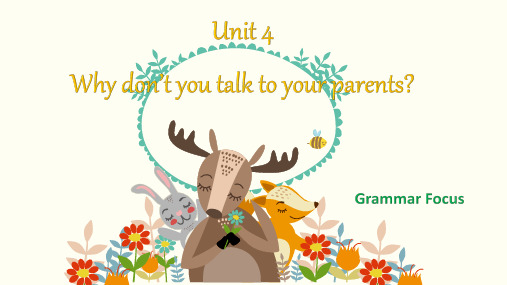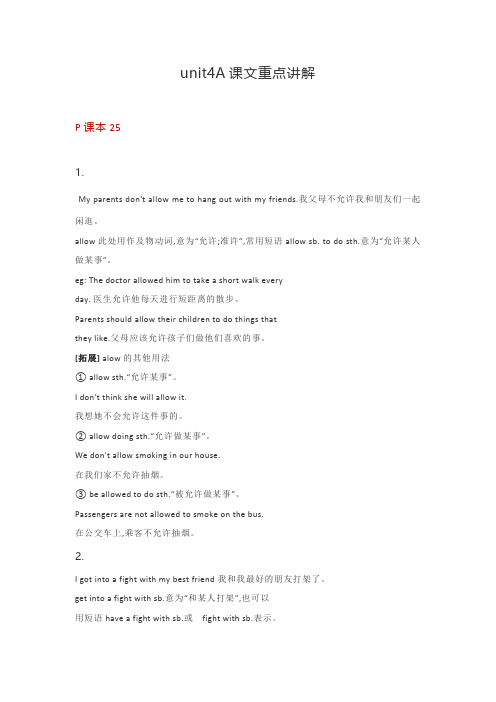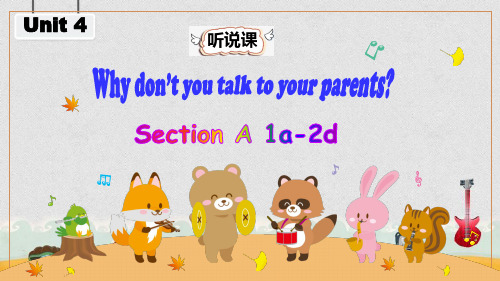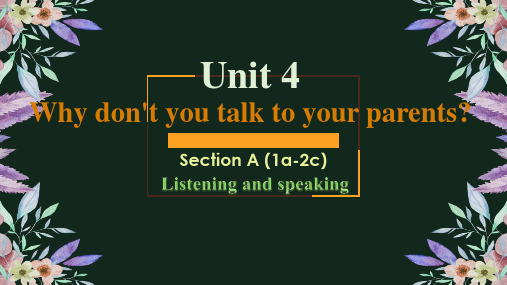八年级下册英语第四单元Section A 1
人教版英语河北省滦平县第七中学八年级下学期Unit4SectionAGrammarFocus课件

5. 他应当如何做? _W__h_a_t_ _sh_o_u_l_d__ he do?
6. 他应当和他的朋友谈一下,以便他能向他 道歉。 He _sh_o_u_l_d__ __t_al_k__ __t_o___ his friend _s_o__ _th_a_t_ he can say he’s sorry.
new words
Don't copy other's homework!
/ ˈkɒpi / v. 抄袭 ;模仿 ; 复制;复印
not …anymore 不再
We won't do it anymore.
/eni:ˈmɔ:r/,再也(不)
Sorry,I will return it to my friend.
1.掌握提出问题的方法, What’s wrong? What’s the matter? What’s the problem/the trouble? 并能讨论所给出的建议。
with sb.
2. 情态动词should, could should,shouldn’t “(不)应该”,常 用来提出请求和建议 could “可以”可也用来给出建议。
Maybe you could go to his house
提建议的表达方法
在英语中,我们可以用多种表达方式提出我们的建议或征求对 方的意见。大多语气比较委婉,显得客气而有礼貌。
why don’t you do sth?
Why don’t you+动词原形+其他成分? = Why not + 动词原形+其他成分?
without asking (returning)
(
)1.—Why not______ to the park now? -Good idea!
八年级英语下册(人教新目标GoForIt!)Unit4第1课时SectionA(1a2d)教学设计

(一)教学重难点
1.重点:本章节的重点在于让学生掌握现在进行时态的用法,并能将其应用于实际场景中进行交流。
难点:如何让学生在实际语境中灵活运用现在进行时态,以及如何提高他们的听说能力。
2.重点:培养学生通过观察、猜测和交流获取信息的能力。
难点:如何引导学生运用所学知识进行有效的信息获取和处理。
3.教师挑选部分学生的作业进行展示和讲评,帮助学生发现并改正错误。
4.针对不同层次的学生,教师设计难易适度的拓展练习,提高他们的语言运用能力。
(五)总结归纳
1.教师引导学生回顾本节课所学内容,总结现在进行时态的用法和特点。
2.学生分享学习心得,互相交流学习方法和技巧。
3.教师强调本节课的重点,提醒学生课后加强练习。
八年级英语下册(人教新目标GoForIt!)Unit4第1课时SectionA(1a2d)教学设计
一、教学目标
(一)知识与技能
在本章节的学习中,学生将掌握以下知识与技能:
1.能够理解和运用表示动作的现在进行时态,如“Is he/she/it…? Yes, he/she/it is. No, he/she/it isn't.”,并能在实际场景中进行灵活运用。
在本章节的学习过程中,学生将通过以下方法提升自己的英语能力:
1.采用任务型教学法,让学生在完成具体任务的过程中,自主探究、合作交流,提高英语听说能力。
2.利用图片、实物等教学资源,引导学生观察、思考、表达,培养他们的观察能力和思维能力。
3.通过角色扮演、小组讨论等形式,激发学生的表达欲望,提高他们的口语表达能力。
4.通过学习英语,拓宽学生的国际视野,让他们了解不同国家的文化,培养跨文化交际能力。
人教版八年级英语下册第4单元 Unit 4 Section A(3a---4c) 教学课件

新课讲解
Mr.Hunt’s advice
It’s normal to have these feelings. _F_i_r_st_l_y_, why doesn’t he _ta_l_k_a_b_o_u__t _the feelings with his family? He should_o_f_fe_r__to__d_o_m__o_r_e_j_o_b_s_ around the house. _S_e_c_o_n_d_l_y__,he could __s_it_d_o_w__n___ and _c_o_m__m__u_n_ic_a_t_e_w__it_h___ his
He can’t ___g_et_ ___o_n_ __w__it_h_ his family. His parents __f_ig_h__t a lot. It’s the only c_o_m_m__u_n_i_c_a_ti_o_n. He doesn’t know if he should _s_a_y_ anything ___to__ them. When they _a_rg_u__e,he is very sad. His elder brother always __r_e_fu_s_e_s_ to let him watch his favorite TV show. _In_s_t_e_a_dhe watches _w_h_a_t_e_v_e_r he wants. Sad and Thirteen always feels__lo_n__el_y_ and _n_e_r_v_o_u_s_.
新课导入
Free talk
1.What problems do they have? 2.Do you have any problems in your daily life?
人教八年级英语下册第4单元 Section A 课文讲解

unit4A课文重点讲解P课本251.My parents don't allow me to hang out with my friends.我父母不允许我和朋友们一起闲逛。
allow此处用作及物动词,意为“允许;准许”,常用短语 allow sb. to do sth.意为“允许某人做某事”。
eg: The doctor allowed him to take a short walk everyday. 医生允许他每天进行短距离的散步。
Parents should allow their children to do things thatthey like.父母应该允许孩子们做他们喜欢的事。
[拓展] alow的其他用法① allow sth.“允许某事”。
I don't think she will allow it.我想她不会允许这件事的。
② allow doing sth.“允许做某事”。
We don't allow smoking in our house.在我们家不允许抽烟。
③ be allowed to do sth.“被允许做某事”。
Passengers are not allowed to smoke on the bus.在公交车上,乘客不允许抽烟。
2.I got into a fight with my best friend我和我最好的朋友打架了。
get into a fight with sb.意为“和某人打架”,也可以用短语 have a fight with sb.或fight with sb.表示。
eg: We can't get into a fight with each other at school在学校我们不能相互打架。
3.What' s wrong?怎么了?1) What's wrong?是口语中常用的一个句型,相当于What's the matter?其主要用法有:①用于询问某人有什么问题或有什么不顺心的事,意为“怎么了?/出什么事了?/哪儿不舒服?”。
2020-2021学年人教版八年级英语下册 Unit 4 Section A1a-2d课件

Period 2 语言点导学
1. (1a) My parents don’t allow me to hang out with my friends. 我 父母不允许我和朋友们一起闲逛。 【探索】allow在此处作及物动词,意为“_允__许__;__准__许__”,常用短 语allow sb. to do sth. 意为“允许某人做某事”。
(1a)3. 允许;准许 ___a_l_lo_w____ (2d)4. 猜测;估计 ___g_u_e_s_s___
(2c)5. 错误的;有毛病 _w__r_o_n_g__
二、重点短语
1. (1a)空闲时间 ___________f_r_e_e_t_im__e________________ 2. (1a)允许某人做某事 _____a_l_lo_w__s_b_._t_o_d_o__s_th_.________ 3. (1a)闲逛 _______________h_a_n_g__o_u_t________________ 4. (1a)和……打架 _____g_e_t_i_n_to__a_f_i_g_h_t_w_i_t_h___________ 5. (1c)哪儿不舒服?____W__h_a_t_’_s_w_r_o_n_g_?_______________ 6. (2a)给某人写信 __w_r_i_te__sb__. _a_l_e_tt_e_r_/w__r_it_e_a__le_t_te_r_t_o_s_b_._ 7. (2a)打电话给某人 ________c_a_l_l_s_b_. _u_p______________
听力原文 听填信息
你将听到的是一封来自一位母亲的求助信。请你根据所听内 容填写下面的信息卡。短文听两遍。听短文之前,你有25秒钟的 时间阅读题目,听完后,你有25秒钟的答题时间。 (W) Dear Mr. Black,
Unit 4 第1课时 Section A【听说课】八年级英语下册件(人教版)

听说课
1. To learn to talk about your problems 2. To learn to give advice Why don’t you…? You should … You could … 3. To learn to use some useful words and expressions: allow, wrong, What's wrong?
What’s the problem/the trouble? 并能讨论所给出的建议。
➢
You should/could +v原.
too much
too much trouble too much time too much homework too much food too much fruit too much work
are not serious?
What about you? Do you have these problems?
1b Listen and circle the problems you hear in 1a.
1. I have to study too much so I don’t get enough sleep. 2. I have too much homework so I don’t have any free
... ...
What do you do with your problems?
A: What’s wrong? B: I’m really tired because I don’t get enough sleep. A: Why don’t you go to sleep earlier this evening?
人教版八年级英语下册第四单元第一课时Unit4SectionA1a-2c

dinner. A:Maybe __y_o_u_s_h_o_u_l_d_t_e_l_l _y_o_u_r_p_a_r_e_n_t_s__that you can’t do so many things. B: I did, but I they think it’s important that I take more after-school classes. A: Well, they probably want you to get into a good senior high school. B: Yes, I guess that’s the reason. A: You should talk to them again. Explain to them that _y_o_u_n_e_e_d__to__g_e_t_e_n_o_u_g_h__s_le_e_p_t_o__st_a_y__h_e_a_lt_h_y_. B: That’s a good idea. OK, I’ll try to talk to them again.
8. stay at school too long
2. ask me to make the bed
…
…
1a
Look at these problems. Do you think they are serious or not?
1. I have to study too much so I don’t get enough sleep.
人教版八年级下册英语Unit4SectionA(1a1c)优秀教学案例

一、案例背景
在我国教育改革的大背景下,英语课程教学逐渐从传统的语法翻译法转向以学生为中心的交际法。人教版八年级下册英语Unit4 Section A (1a-1c)的教学内容围绕着“家务劳动”这一主题,旨在帮助学生掌握与家务相关的词汇和句型,并能运用所学进行真实情境下的交流。本案例以该单元为载体,结合学生的生活经验和认知水平,运用任务型教学法,提升学生的英语实际运用能力。
3.教学过程:
(1)教师展示与家务劳动相关的图片,引导学生学习词汇和句型。
(2)教师创设情境,让学生运用一般现在时描述家庭成员的日常家务活动。
(3)教师通过示例、讲解、练习等形式,帮助学生掌握语法知识。
(三)学生小组讨论
1.教学活动:将学生分成小组,让他们围绕家务劳动主题进行讨论,如:“What chores do you do at home? Can you describe your family members' chores?”等。
(二)问题导向
以问题为导向的教学策略可以激发学生的思考,培养他们的问题解决能力。在本章节的教学中,我将设计一系列与家务劳动相关的问题,如:“What do you do at home? Can you describe your family members' chores?”等,引导学生运用所学词汇和句型进行回答。通过这种方式,让学生在实际情境中运用英语,提高他们的语言表达能力。
2.教学目的:让学生对家务劳动产生兴趣,为新课的学习做好铺垫。
(二)讲授新知
1.教学内容:针对本节课的词汇和句型进行讲解,如clean the room, make the bed, wash the dishes等,并结合一般现在时介绍家庭成员的日常家务活动。
- 1、下载文档前请自行甄别文档内容的完整性,平台不提供额外的编辑、内容补充、找答案等附加服务。
- 2、"仅部分预览"的文档,不可在线预览部分如存在完整性等问题,可反馈申请退款(可完整预览的文档不适用该条件!)。
- 3、如文档侵犯您的权益,请联系客服反馈,我们会尽快为您处理(人工客服工作时间:9:00-18:30)。
4. I have too many after-school classes.
Why not talk about it with your parents?
5. I got into a fight with my best friend.
Why not call him up?
Listen and circle the 1b problems you hear in 1a.
Role-play a conversation between 2c Peter and his friend.
What’s the matter, Peter?
I had a fight with my best friend. What should I do?
Well, you should call him so that you can say you’re sorry.
1. I have to study too much so I don’t get enough sleep. 2. I have too much homework so I don’t have any free time to do things I like. 3. My parents don’t allow me to hang out with my friends. 4. I have too many after-school classes. 5. I got into a fight with my best friend.
Why not talk about it with your parents?
2a Listen. Peter’s friend is
giving him advice. Fill in the blanks with could or should.
1. You ______ could write him a letter. ( ) 2. You ______ should call him up. ( ) 3. You ______ should talk to him so that you can say you’re sorry. ( ) 4. You _____ could go to his house. ( ) 5. You _____ could take him to the ball game. (
What’s wrong?
My parents don’t allow me to hang out with my friends.
Why not read some interesting books at home?
What’s wrong?
I have too many afterschool classes.
You’re right. Thanks for your advice.
No problem. Hope things work out.
1. I guess you could tell her to say sorry. guess[ɡes] v. 猜测;估计
e.g. Let us guess the height of the building. 让我们来猜一下这个建筑物的高度。
It’s a big deal, David, bigger than you know. 这事挺重要的,戴维,比你所知道的要重 要。 What's the big deal? It’s only a birthday, not the end of the world. 有什么了不起的?这不过是个生日,又不 是世界某日。
Look at these problems. Do you 1a think they are serious or not? 1. I have to study too much so I don’t get enough sleep.
2. I have too much homework so I don’t have any free time to do things I like.
2. I have too much homework so I don’t have any free time to do things I like.
Why don’t you go to a movie this evening? 3. My parents don’t allow me to hang out with my friends. Why not read some interesting books at home?
3. My parents don’t allow me to hang out with my friends.
4. I have too many afterschool classes.
5. I got into a fight with my best friend.
Discuss these problems and give some advice. 1. I have to study too much so I don’t get enough sleep. Why don’t you go to sleep earlier this evening?
2. wrong[rɒŋ] adj. 错误的;不 对的= not right e.g. Some words on the advertisement are wrong. 广告上的一些字错了。
Write three conversations about your problems and your friends’ suggestions. A: I have too many after-school classes. What could I do? B: You could …
What’s the matter with the boy? =What’s wrong with the boy? He has too much homework to do.
Does he like playing football?
Yes, he does. But he doesn’t have any free time to do things he likes.
Look at the problems in 1a 1c and make conversations.
What’s wrong?
I'm really tried because I studied until midnight last night.
['mɪdnaɪt] n. 午夜
Why don’t you go to sleep earlier this evening?
Is it possible to work out the problem? 有可能解决这个问题吗?
1. allow [ə'laʊ] v. 允许;准许 allow sb. (not)to do sth. (不)允许某人做某事 e.g. My parents don’t allow me to stay up late. 我父母不允许我熬夜。 Mr. Smith allowed Mike to drive there. 史密斯先生允许迈克开车去那里。
2. Although she's wrong, it’s not a big deal. big deal是英语中的一个固定搭配,表 示 “重要的事情或状况”,多用于非正式 交流。作否定用法时,常说It’s not a big deal或It’s no big deal.表示说话人并不认 为某事有什么了不起。 e.g. There's a soccer game on TV this evening but I don’t have to watch it. It’s no big deal. 今天晚上电视上有一场足球 赛,但我不一定要看。没什么大不了的。
Hmm… that’s not very nice. Did she give them back to you?
Yes, but I’m still angry with her. What should I do?
Well, I guess you could tell her to say sorry. But why don’t you forget about it so that you can be friends again? Although she’s wrong, it’s not a big deal.
2d Role-play the conversation.
You look sad, Kim What’s wrong?
Well, I found my sister looky. She took some of my new magazines and CDs.
3. Hope things work out. 希望事情会好起来。 这是一种常见的表达法,表示某些不 如人意的事情会随时间的推移逐渐有所 改观。
work out 解决(问题);算出 e.g. Mike worked out the difficult problem by himself. 迈克自己算出了那道难题。
)
2b Listen again. Fill in the blanks.
Why Peter doesn’t like the advice a. It’s not easy. b. I don’t want to wait that long. c. I don’t want to surprise him. d. I’m not good at writing letters. e. I don’t want to talk about it on the phone. 1. ____ 3. _____ 4. ____ 5. _____ d 2. _____ e a c b
